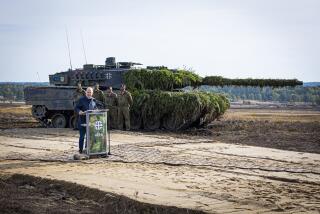Bonn Stresses Timing in Modernizing Missiles
- Share via
WASHINGTON — West German Defense Minister Manfred Woerner, after meetings in Washington with Reagan Administration officials and lawmakers, said Tuesday that West Germany is willing to modernize its force of short-range nuclear missiles, although he stressed this would not be necessary before 1995.
“There’s no problem with the basic decision” to replace the aging Lance nuclear missiles, Woerner told reporters. “If there’s disagreement, it’s about the timing.”
Woerner’s remarks come as the North Atlantic Treaty Organization is trying to forge a united position on the modernization of its nuclear forces in the wake of a U.S.-Soviet treaty eliminating medium-range missiles. That effort has been complicated by Soviet attempts to limit the remaining nuclear weapons in Europe in negotiations linked to the forthcoming conventional arms reduction talks in Vienna.
At a March 2-3 summit meeting, NATO committed itself to maintain “effective nuclear and conventional forces, which will continue to be kept up to date where necessary.” While the NATO statement set no timetable for the modernization of those forces, alliance leaders, including British Prime Minister Margaret Thatcher, said there would be no delay in updating short-range and tactical nuclear weapons systems.
Bonn agreed in a 1983 NATO meeting to support the modernization of the Lance, which is designed for use against the Warsaw Pact’s command posts, air defense sites and troop concentrations. But the West German government of Chancellor Helmut Kohl has been reluctant to make early commitments to develop and deploy such a weapon on West German soil, preferring to explore negotiated alternatives with Moscow first, according to senior German and American officials.
One senior Bonn official said it would be “counterproductive” for the Atlantic Alliance to detail its arms modernization plans while it is trying to coax concessions from the Soviets at the strategic arms negotiations in Geneva and at the conventional forces reduction talks in Vienna.
But if negotiations fail to remove Europe’s short-range nuclear missiles, Woerner made clear that he would prefer that the allies develop a longer-range replacement for the Lance, which U.S. forces feel will be completely obsolete by 1995. Such a replacement system could reach targets almost 300 miles away, a range just below the minimum of those weapons banned by the Intermediate-range Nuclear Forces treaty signed in Washington in December. The Lance has a range of only 75 miles.
A missile with a longer range could be deployed not just in West Germany, but also in Italy, Belgium and the Netherlands and still reach targets in Eastern Europe. More important, say experts on Bonn’s defense policy, it would ease West Germany’s concern that short-range nuclear weaponry would be used exclusively to wage wars on German soil.
The U.S. Army is eager to begin developing a nuclear-tipped replacement for the Lance called the advanced tactical missile system. But lawmakers have directed the service to seek Congress’ approval before moving beyond the study stage. Congress may seek a West German commitment to field the weapons in peacetime before approving further work on the missile, according to congressional aides.
Woerner, who is to succeed Britain’s Lord Carrington as NATO secretary general in July, played down European divisions over the nuclear modernization issue.
More to Read
Sign up for Essential California
The most important California stories and recommendations in your inbox every morning.
You may occasionally receive promotional content from the Los Angeles Times.











